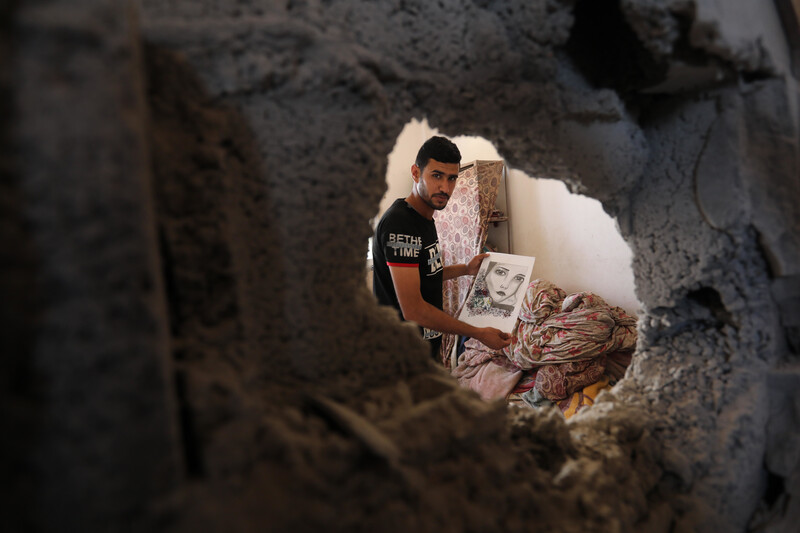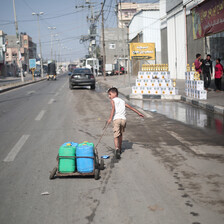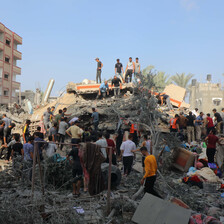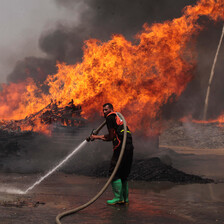The Electronic Intifada 19 August 2022

A man shows off a drawing from inside a home damaged in the latest Israeli assault on Gaza.
APA imagesIt was around afternoon prayers when my sister called to warn us that there was escalation, that the situation looked dangerous.
“Take care of yourself,” she said in a trembling voice.
“War again,” sighed my nephew, just 16.
My family was supposed to pay a visit to my aunt to congratulate her on her daughter’s tawjihi, or high school, results, which had been announced two weeks earlier.
That was the plan.
But plans in Gaza turn to dust, just like the buildings Israel bombs. And the bombing started on that Friday, 5 August. For the next few days, we lived in a far too familiar emergency.
All of a sudden, we had to cancel all plans. We decided to stay at home. My brother turned the radio on. I hate the radio, it’s always bad news. I turned it off. My brother turned it on again. I escaped to social media. All my friends’ news feeds were filled with fearful posts about what was coming.
Above us all, the drones started hovering and buzzing. The anxiety-inducing soundtrack became louder and louder.
Several of my nieces and nephews were around. I leaned in to listen to their conversation.
“How many wars have you witnessed?” one asked. At first I thought they were joking. They weren’t.
“Two wars,” came one answer.
“All wars,” came another.
“All wars except one.”
“I was one when the 2014 war happened.”
Back to ‘normal’
How strange it is that we measure our age by the number of wars we have witnessed. Or rather, how strange it is not. Having lived through repeat wars without any chance to recover from trauma leaves emotional scars. People are angry. People grow anxious. There is depression. There is substance abuse.
And we ask questions that come from such bitter experience. Will it last as long as the 2014 war? Will it be short but deadly like in 2012? Will it be like 2021?
War, no matter how long or short, is war. Comparisons fail to convey that all wars are in a fundamental sense the same.
As it turned out – but how were we to know? – the war this time lasted three days. But it was still war. War is about losses, it is about death and destruction. War is fear. War is anxiety. War is helplessness. War is horror. This one showed, yet again, our inability to protect ourselves, our families and our loved ones.
The UN confirmed a total of 46 Palestinians dead, including 17 children. Gaza’s ministry of health reported 360 injured, including at least 151 children, 58 women and 19 older persons.
More questions. Are our lives so cheap that no one cares for them? Why is the world so indifferent to what is happening to us, but so angry about Ukraine?
The flagrant human rights violations, the wars and the near-constant bombardments in Gaza, coupled with Israel’s 15-year-long blockade there and the havoc Israeli soldiers wreak across the West Bank, where violent raids are the norm, have made our lives extremely hard, our fates precarious and our futures uncertain.
Nights are the worst. In war, night strikes fear into your heart. All of a sudden, short summer nights became unbearably long.
Nights are for death. It was just after nightfall on Saturday that we heard about the Rafah massacre that killed seven, one of them just 13.
Nights are for fear. My one-and-a-half-year-old nephew will not stop jumping around, whether off the sofa or climbing in the kitchen or running. For that, we call him “monkey.” He was startled one time, when a loud explosion struck nearby. I held him close. I could feel his heart pounding in his tiny body.
It is said that, “you own the future.” This may be true of the rest of the world. We, here in Gaza, own nothing, not even tomorrow night.
The ceasefire brokered by Egypt and the UN came into effect on 7 August at 23:30. We are expected to go back to “normal” as if nothing happened. We are supposed to just cope: with the trauma, the fear, the unemployment, the poverty, the insecurity, the lack of any future, the lack of options.
What is normal in Gaza? There are no jobs, there is no freedom of movement, there are no prospects. Electricity is rationed. The water is contaminated and scarce.
Normal.
We checked up on all our relatives. We offered our condolences to those grieving. We know this is not the last time Palestinian blood will be shed so cheaply.
Ghada Al-Haddad is a journalist based in Gaza.





